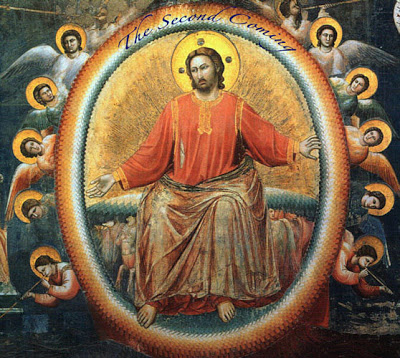

| Online: | |
| Visits: | |
| Stories: |

| Story Views | |
| Now: | |
| Last Hour: | |
| Last 24 Hours: | |
| Total: | |
TradCatKnight: The Second Coming of Christ
The Second Coming of Christ
Music: Dies Irae by Hector Berlioz: Volume Controls at the bottom of the page
II. The general judgment. Last Sunday we explained the circumstances of the general judgment, today we assign the reasons for it: 1. Only at the last day can the total results of good or evil be known. 2. A general judgment will be the means of rectifying the injustices of life and of vindicating the ways of God’s providence. 3. By means of a judgment following the resurrection the body will have part in the rewards or punishments of the soul. 4. The sentence pronounced at the general judgment will be a public and solemn ratification of the private sentence at the particular judgment.
III. The particular judgment, 1. This takes place at the moment of death–” It is appointed unto man once to die, and after death, the judgment” (Heb. ix. 27). 2. There is a similarity between the end of the world and the death of the individual: (a) both are certain–”my words shall not pass” (Luke xxi. 33) (b) the time of both is uncertain–”the day and the hour no man knoweth” (Matt. xxiv. 36) ; (c) both are accompanied by temptations and tribulations–”there shall arise false Christs,” etc., “the sun shall be darkened,” etc. (Matt. xxiv. 24, 29). 3. The similarity between the particular and the general judgments: (a) it is the same person with his whole life who is judged in both cases; (b) the sentence is irrevocable in both cases.
CONCLUSION. l. The importance of frequent reflection on death and of constant preparation by vigilance against temptation and by prayer for perseverance. 2. Preparation for a favorable judgment by judging oneself now, by refraining from judging others, by performing works of charity, etc. (Matt. xxv. 35-46). 3. For the just the thought of the judgment is a consolation, “look up, and lift up your heads, because your redemption is at hand” (Luke xxi. 28); “Come, Lord Jesus” (Apoc. xxii. 20).
Catechism of the Council of Trent, Part I
ARTICLE VII OF THE CREED
From thence he shall come to judge the living and the dead.
THE THREE OFFICES OF CHRIST
Jesus Christ is invested with three eminent offices and functions: those of Redeemer, Patron, and Judge. But as in the preceding Articles it is shown that the human race was redeemed by His passion and death, and as by His ascension into heaven it is manifest that He has undertaken the perpetual advocacy and patronage of our cause, it follows that in this Article we set forth His character as Judge.
MEANING OF THE ARTICLE ON THE LAST JUDGMENT
The scope and intent of the Article is to declare that on the last day He will judge the whole human race. The Sacred Scriptures inform us that there are two comings of Christ,–the one when He assumed human flesh for our salvation in the womb of a virgin; the other when He shall come at the end of the world to judge mankind. This coming is called in Scripture “the day of the Lord.” “The day of the Lord,” says the Apostle, “shall come, as a thief in the night”; (1) and our Lord Himself says, “Of that day and hour nobody knoweth.”(2) In proof of the last judgment it is enough to adduce the authority of the Apostle: “We must all,” says he, “appear before the judgment seat of Christ, that every one may receive the proper things of the body, according as he hath done, whether it be good or evil.”(3) Sacred Scripture abounds in testimonies to the same effect, which the pastor will meet everywhere throughout the Inspired Volume, (4) and which not only establish the truth of the dogma, but also place it in vivid colors before the eyes of the faithful. And, if from the beginning, the “day of the Lord,” on which He was clothed with our flesh, was sighed for by all as the foundation of their hope of deliverance, so also, after the death and ascension of the Son of God, the second “day of the Lord,” we should make the object of our most earnest desires, ” looking for the blessed hope and coming of the glory of the great God.”(5)
TWO JUDGMENTS
But with a view to the better explanation of this subject the pastor is to distinguish two distinct periods at which every one must appear in the presence of God, to render an account of all his thoughts, words, and actions, and receive sentence accordingly from the mouth of his Judge: the first, when each one departs this life; for then he is instantly placed before the judgment seat of God, where all that he had ever done or spoken or thought during life shall be subjected to the most rigid scrutiny; and this is called the particular judgment: the second, when on the same day and in the same place all men shall stand together, before the tribunal of their judge, that in the presence and hearing of a congregated world each may know his final doom,–an announcement which will constitute no small part of the pain and punishment of the wicked, and of the remuneration and rewards of the just, when the tenor of each man’s life shall appear in its true colors.



